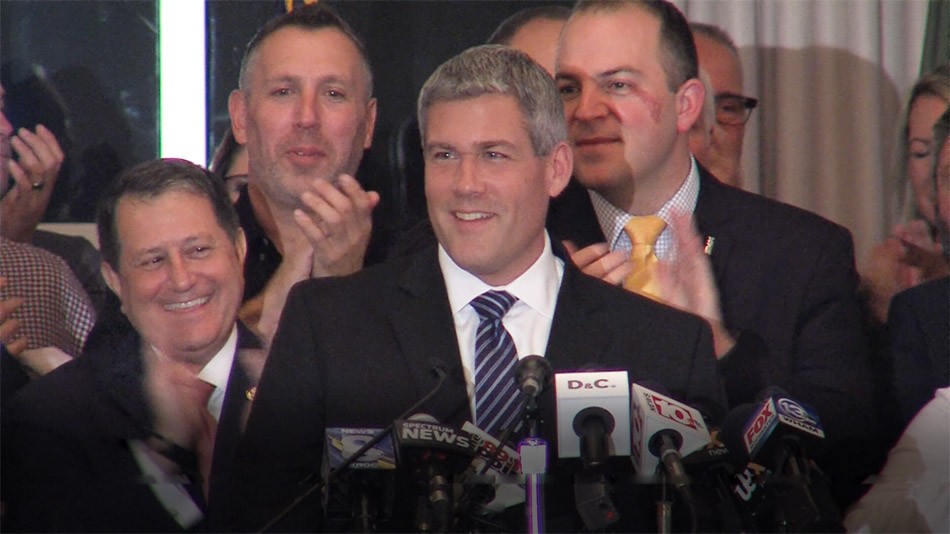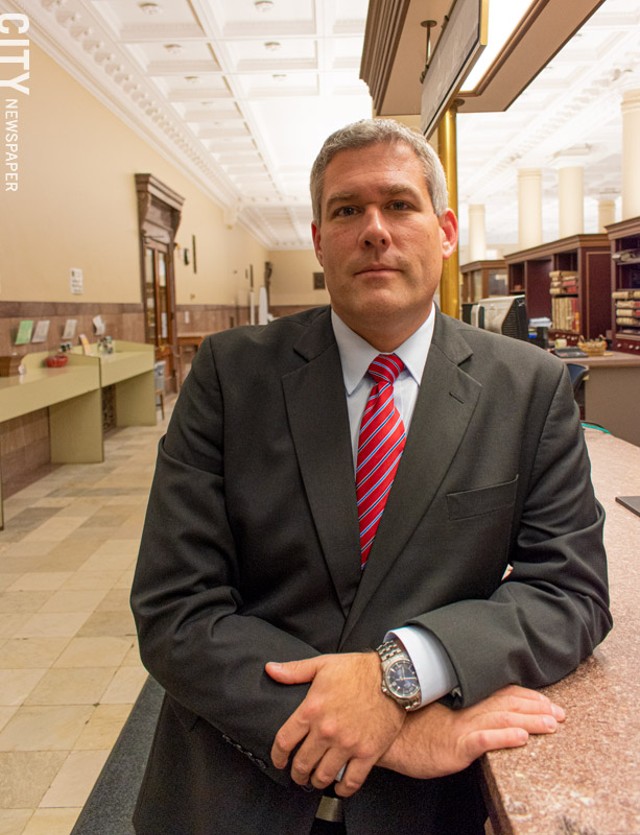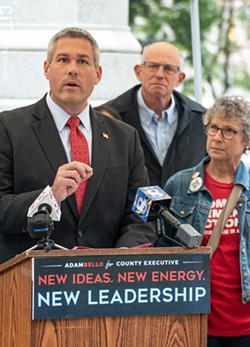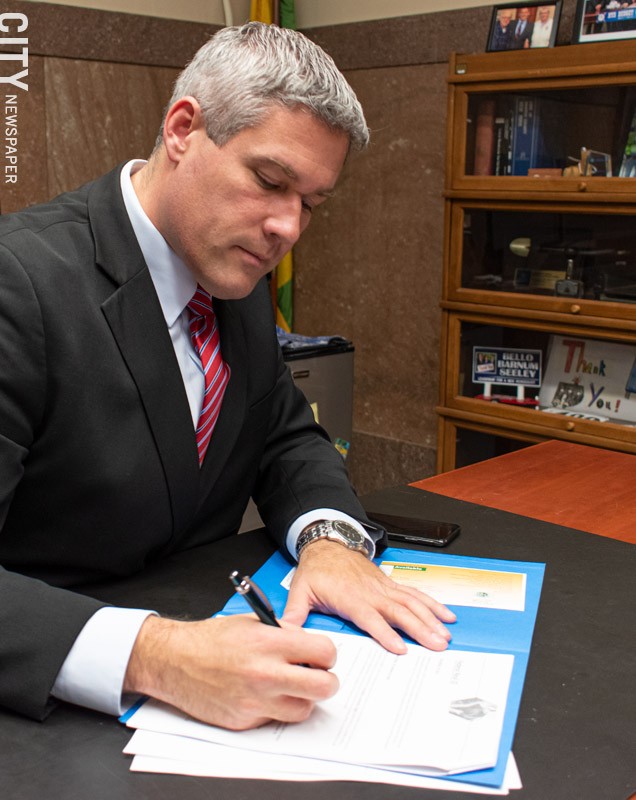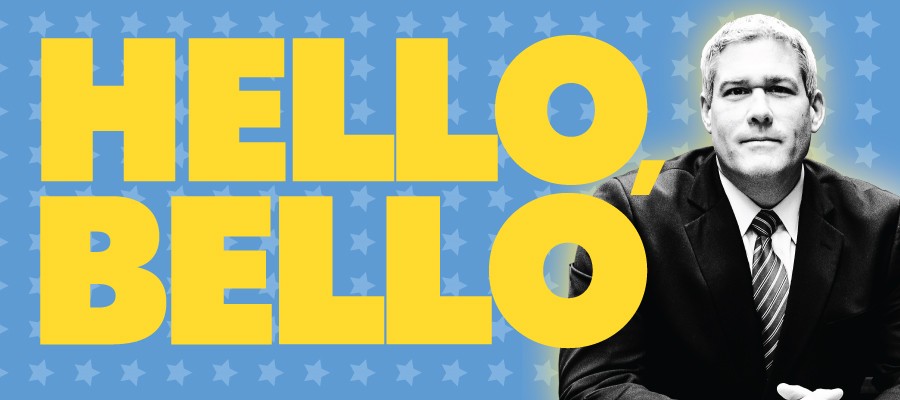
[
{
"name": "500x250 Ad",
"insertPoint": "5",
"component": "15667920",
"parentWrapperClass": "",
"requiredCountToDisplay": "1"
}
]
Adam Bello appeared to float across the ballroom of the Hyatt Regency Rochester.
Buoyed by a throng of cheering supporters, he had just been whisked from the podium from which he declared victory in the race for Monroe County executive.
The 39-year-old Democrat had made history by snapping 27 years of Republican rule in the office and delivered an acceptance speech effusive in its promise of a county government that would be "a force for good, a convener of ideas, and a catalyst for unity."
"That's the government you deserve, and I cannot wait to get to work to make it happen for you," Bello concluded to thunderous applause.
Now, chants of "Adam! Adam! Adam!" serenaded him as he appeared to glide toward the ballroom exit ringed by admirers, as though he were royalty being held aloft on a litter carried by his closest confidants.
Then gravity hit.
"Frankly, we got out of the ballroom and turned to each other and said, 'What are we doing tomorrow?'" said one those confidants, Irondequoit Supervisor David Seeley.
Seeley's description recalled the closing scene of the 1972 dark comedy film "The Candidate," in which a first-time Democratic contender for Senate played by Robert Redford improbably defeats an entrenched Republican incumbent.
At the end, Redford's character asks his campaign manager amid a crush of supporters, "What do we do now?" The question contained a hint of dread and went unanswered, as his voice was drowned out by the adoring crowd and the credits rolled.
In the nearly half-century since that film, the line has become an inescapable cliché of Election Day spoils because of its inherent truth: No newly elected official has a firm grasp on what lies ahead. Most of their energy has been put into winning, not governing.
While Bello himself has not asked the question publicly, members of his party and observers of politics and government in Monroe County have been asking it in the week since his historic election.
"I think Adam and his inner circle are looking at each other and saying, 'Holy smokes, what are we going to do here?'" said Dave Garretson, the former chair of the Monroe County Democratic Committee.
THE INNER CIRCLE HUNKERS DOWN
The next morning, a small cadre of Bello's closest associates hunkered down in an office at Monroe County Democratic Committee headquarters on University Avenue to hash out a strategy.
There was Rep. Joe Morelle, who has known Bello since the latter was a boy, and whom Bello regards as his political mentor.
There was Seeley, who, like Bello, was a former adviser to Morelle, and won his first election on the ticket with Bello in Irondequoit in 2013. Bello was elected supervisor that year and Seeley to the town council.
There was Jeff McCann, a politically shrewd, under-the-radar Democrat-turned-Republican-turned-Democrat whose resume includes stints as the Democratic town leader in Greece, a Monroe County legislator as a Republican, and deputy county clerk under Bello.
For his part, Bello, a married father of two young children, was spending time with his family, reachable on a phone that wouldn't stop ringing.
What lay before them were challenges big and small that no local Democrat has tackled in nearly three decades – namely forming a county government in about 55 days.
"One of the things we did not do a whole lot of, partly because of superstition and not wanting to get ahead of ourselves, was we didn't spend a whole lot of time pre-planning this," Morelle said.
People who sat in on the morning-after meeting described it as a brainstorming session of more questions than answers.
How could they best communicate with the outgoing administration to extract the information they need to make informed decisions? Would the heads of each department of government be willing to prepare transition memos? What major initiatives are under way? How would they identify red flags?
"It's true that in the lead-up to Election Day we did not spend a lot of time thinking about the next day because I am not one to be presumptuous about how elections are going to turn out," Bello said in an interview Monday.
"However," he added, "on Election Night and on the day after Election Day, we started the process of mapping out what a transition would look like, the timeline that we would follow and to make sure we had a process."
Bello said he expected to introduce as early as this week members of his transition team, whom he described as people not in government but "out in the community working."
A VOID OF INSTITUTIONAL KNOWLEDGE
Tapping institutional knowledge within the Democratic Party was a near impossibility because there were so few people who possessed it. The last and only Democratic county executive, Thomas Frey, who was elected to a single term in 1987, died two years ago.
Clay Osborne, who was the deputy county executive for operations under Frey, recalled the two-month stretch between Frey's election and assuming office as a period marked by guesswork and high anxiety for both the incoming and outgoing administrations.
Frey defeated Lucien Morin, a Republican who had been at the helm of county government for 14 years, in a divisive campaign. Consequently, the heads of many key departments expected to lose their jobs and refused to cooperate with Frey's transition team.
"I would say there was not a lot of transparency at the time in terms of getting what we needed from the previous administration," Osborne said. "We had to create from whole cloth, with very little information, some of the decisions we had to make."
Bello said he spoke with the outgoing county executive, Cheryl Dinolfo twice in the week since the election and that he expected a "smooth transition."
"We're professionals," he said. "I'm going to approach this as if everybody involved wants what's best for Monroe County. Elections are one thing, government is another."
Theoretically, that is true. But in Monroe County it is sometimes difficult to separate politics from government.
For instance, Brayton Connard, the county's director of human resources – a position from which tabs can be kept on employees – was an unabashed supporter of Dinolfo and her predecessor, Maggie Brooks, whose campaigns he helped manage.
POLICY, POLITICS, AND PATRONAGE
Monroe County employs about 3,000 people. Most of them are civil servants whose jobs are permanent regardless of who controls the executive office.
But the heads of the county's dozen or so departments that are critical to everyday life – from Human Services to Transportation and Planning and Development – are appointed by the county executive.
Under them are scores of provisional jobs that have been filled over the years with patronage hires – people who may or may not have been qualified for their positions but were chosen for their ties and loyalty to the county executive or the Republican Party.
These two tiers – perhaps as many as 150 employees – are the people who control county government. The other 2,850 people make it work.
"You have 30 years of Republican administrations and a lot of the organizational chart (in those top two tiers) didn't change too much over the last decade," Seeley said.
Osborne said there are three approaches to the top two tiers an incoming administration can take: Retain them, clean house, or employ a mix of both that keeps workers who will buy in to the direction set by the new guard and weeds out the rest.
"I would say the biggest challenge was balancing political commitments and operational commitments," Osborne said. "Sometimes those things align and sometimes they don't."
The Frey administration is remembered for being strong operationally and weak politically. Frey admitted as much before his death.
He lasted just four years in office, but he pushed through services and projects on which Monroe County now relies.
Frey oversaw a massive expansion of the Greater Rochester International Airport, introduced the county's recycling program, initiated construction of the Mill Seat Landfill in Riga, and persuaded Monroe Community College to open a downtown Rochester campus.
All of that came with a price: A tax hike that cost Frey re-election.
"We tried to do a lot of good stuff in that four years," Frey told the Democrat and Chronicle a few months before he died. "I think of it as the last time the county tried to do anything, except cut taxes."
A BLACK BOX
In the waning days of the campaign, County Executive Cheryl Dinolfo released a budget for the upcoming fiscal year that included a reduction in the property tax rate of 10 cents per $1,000 in valuation. If adopted, it would be the second such tax rate cut in as many years.
Bello was critical of the cut, noting that the budget's tax levy – the amount the county anticipated collecting – was projected to rise 2.4 percent. The pattern followed that of the current year, in which the tax levy rose by 3 percent, despite a tax rate cut.
While bond and credit rating agencies have upgraded the county's statuses, the county remains on the state comptroller's list of 25 local governments under fiscal stress, although the degree of that designation has improved in recent years.
Democrats in the County Legislature, where they are in the minority, have lamented for years that they have been kept in the dark on the county's true fiscal condition. Observe a committee meeting and it is easy to see why.
Attempts by Democrats to extract the simplest details of proposed legislation are often met with resistance by the majority and the executive branch. Sometimes, they have to resort to invoking the Freedom of Information law. Other times, they are presented with the information with too little time to digest it before having to make a decision on it.
"The way the Republicans have run government over the last decades, it's a black box," said Garretson, the former head of the county Democratic party.
Among the concerns in the Bello camp is that his administration doesn't know what it will find upon being sworn in.
Shortly after he was appointed county clerk – to fill a vacancy left by Dinolfo when she became county executive – Bello discovered paperwork intended to protect the privacy of some 20,000 pistol permit holders had never been processed.
On the campaign trail, Bello spoke openly about his suspicions about the county's financial health. He said he would order an audit of the entire operation upon being elected.
"As far as the county's finances, there's been a number of mixed messages they've been giving us over the years," he said. "There was an announcement of a budget surplus a couple of years ago, yet we have trouble coming up with funding to keep commitments to retiree health care benefits."
A DIVIDED GOVERNMENT
Bello will assume office with a divided government. While Democrats picked up seats in the County Legislature, Republicans hold a slim majority of 15 to 14.
A Bello administration will presumably be friendlier to Democrats who request information. But how it will manage to govern, and how it will be received by a Republican majority, remains to be seen.
"I don't think the legislature functions quite the right way," Bello said. "It's very split along party lines, to the point that legislation proposed by Democrats doesn't even get voted on."
He said he anticipated working closely with the Republican majority.
"We have to," he said. "I can't accomplish everything I want to do unless I have a legislature that wants to accomplish those goals, and I assume the legislature has things it wants to accomplish."
Some of his goals include focusing on services for children and families, particularly Child Protective Services and child care subsidies — both troubled areas in the Dinolfo administration — and the county's Early Intervention program for children at high risk of developmental delays.
"The politics will take care of themselves," Bello said. "I'm not worried about my re-election or future makeup of the County Legislature. I'm worried about getting something done."
The last time the county had a divided government was a single year – 1992 – after Frey had been ousted by Robert King, a Republican.
The year was fraught with infighting among the Democratic majority. Two Democratic legislators began caucusing with the Republicans, and another defected altogether.
When King claimed to have discovered a $42 million budget deficit created by his predecessor, Democrats complained he wouldn't produce specifics behind the number and refused to cooperate with his legislative priorities.
By that summer, residents packed the legislative chamber to demand an end to what they viewed as a stalemate brought on by political posturing. The Democrats would lose their majority within months. They have yet to regain it.
Seeley called the divided government "a good opportunity" for Bello.
"Some people might say, 'How are you ever going to get anything done?'" Seeley asked. "He'll have to be able to work with another party to govern. His interest is doing that outreach to form a coalition government and not see the opposition as the opposition but a partner in government."
A GROUNDBREAKER BOUND BY TRADITION
Bello will assume the office of county executive after more than two decades of loyal, quiet service to the Monroe County Democratic Party, making him a groundbreaker who is very much bound by tradition.
In his race against Dinolfo, Bello positioned himself as a moderate, a middle-of-the road choice for a hyper-partisan county that ran like a patronage mill whose nepotism, prior to Dinolfo's administration at least, fed scandal.
Recall that the husband of Dinolfo's predecessor, Maggie Brooks, was convicted in a bid-rigging scheme involving a $212 million county contract. The former director of the Greater Rochester International Airport, David Damelio, who was fired for spending tens of thousands of public dollars on pricey cigars for his personal use, had been the Penfield Republican Party leader.
But Bello's service to his own party runs deep, too. Morelle recalled being a junior Assembly member in Albany the first time he met Bello.
It was 1992, and Morelle was running for a second term. Bello showed up at a fundraiser with his parents wearing a suit. He was around 12 years old, as Morelle recalled, and sat at the front desk where his job was to ensure attendees signed in.
Bello's history and his ascension to the most powerful position in Monroe County raises two obvious questions.
The first is what priority he will place on building an administration that stretches beyond the cadre of white men that make up his inner circle.
McCann, the deputy county clerk, will almost certainly occupy a prominent place in a Bello administration. Morelle will remain a Congressman, and Seeley said he wants to stay supervising Irondequoit.
"To do that, you obviously have to start looking for people that look like the community," Morelle said. "We have to identify talented people while being respectful of the diversity of the community."
The second question is what effect his election will have on the power structure within the county Democratic Party.
A rule of thumb in county politics of late is that the most powerful local elected official in a party is also its de facto head.
Republicans witnessed that firsthand in 2013 when Brooks, as county executive, orchestrated the ouster of the late Republican county kingmaker Stephen Minarik.
The Monroe County Democratic Committee has endured some turmoil since Rochester Mayor Lovely Warren upset the party dynamic in 2013 with a primary victory over the incumbent, Tom Richards.
Her win widened a schism in the party that had been simmering between an old-guard establishment of mostly white people and an emerging group of candidates and operatives, many of whom were people of color, with loyalty to the mayor.
To that end, Warren has arguably more influence on the makeup of the Monroe County Democratic Committee than perhaps anyone else in recent years.
The most obvious example of her influence was the installation of her campaign manager, Brittaney Wells, as chair of the committee last year.
Wells, who was the first African-American to lead the local party, called it "a new day in the Monroe County Democratic Committee" and promised to build bridges, a tacit nod to the internal strife.
Bello downplayed his influence in the party, saying Wells has done "a great job" as the committee chair, and calling himself, Morelle, and Warren "a team."
"I like the team we have and I view this as teamwork," he said.
David Andreatta is CITY's editor. He can be reached at [email protected].
